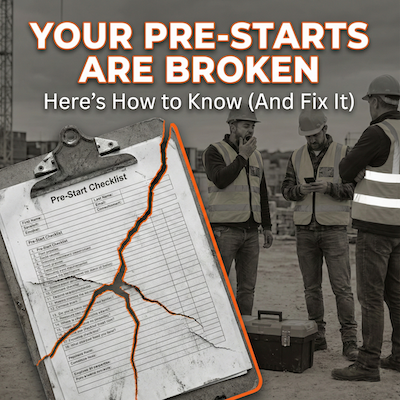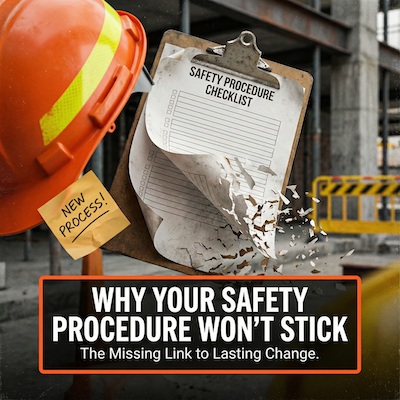In the chaotic world of a construction site, with jackhammers pounding and cement mixers churning, there's a quiet hero who often goes unnoticed. That hero is Bob, an introverted safety manager whose keen eye for detail averted a major incident one blustery Wednesday afternoon. Bob noticed a critical flaw in a crane's hook assembly, a detail that everyone else had overlooked in the hustle and bustle. This is just one example of the valuable contributions introverts like Bob make in the construction industry.
Introverts are often misunderstood and underappreciated in our extroverted-centric society. In a construction safety environment, their unique skills and perspectives are often overshadowed by the bustling nature of the job. This blog post aims to shed light on the essential role of introverts in construction safety management, underscoring the invaluable talents they bring to the table.

Breaking Down the Stereotypes: Introverts in the Workplace
Introverts are commonly stereotyped as shy, socially awkward individuals who prefer solitude over social interaction. This oversimplification doesn't do justice to the depth and diversity of introverted personalities. Introverts are typically introspective, thoughtful, and observant, possessing an ability to concentrate and delve deeply into complex issues—a valuable trait in any field, including construction safety.
The workplace, including construction sites, can be a vibrant mix of different personalities. However, traditionally, extroverted traits like assertiveness and outspokenness have been more valued. This needs to change. Diversity is not just about race, gender, or age—it also includes diversity in thought, perspectives, and personalities. Inclusivity entails recognizing, appreciating, and leveraging the unique talents of all workers, including the quiet strength of introverts.
In the context of construction safety management, it is essential to acknowledge and understand the skills and capabilities that introverted individuals bring. In the next sections, we will explore these talents in detail, as we strive to highlight the significant role of introverts in enhancing safety in the construction industry.

Unearthing the Hidden Talents of Introverts in Construction Safety Management
Introverts are typically characterized by a strong ability to focus, deep thinking, and attentiveness to detail. In the context of construction safety, these traits translate into exceptional talents that can enhance safety measures and protocols.
- Attention to Detail: Introverts' natural tendency to observe and pay attention to the minutiae makes them excellent at identifying potential safety hazards that others might overlook. In the rapidly changing environment of a construction site, their knack for spotting irregularities can prevent accidents.
- Deep Focus: Introverts have a unique ability to dive deep into tasks, concentrating for long periods. This trait is invaluable in construction safety management, where careful assessment of plans, compliance measures, and safety protocols are required.
- Thoughtfulness and Deliberation: Introverts tend to think before they speak or act. In a safety context, this thoughtfulness translates into careful risk assessment, methodical planning, and deliberate actions, all essential for maintaining a safe construction environment.
- Listening Skills: Introverts are often exceptional listeners, which aids in effectively understanding safety concerns raised by team members. This ability to actively listen and respond can build trust among the crew and encourage open communication about safety matters.

Introverts and Team Dynamics in Construction Safety
Introverted safety managers have the potential to shape construction site dynamics and safety cultures in unique ways. While their quiet demeanor may contrast with stereotypical leadership styles, their strengths can become a boon to safety management:
- Cultivating Comprehensive Communication: Introverted leaders naturally ensure inclusive communication. While they may not always be the loudest in the room, they are often the ones who encourage others to voice their opinions and concerns. This inclusive approach can result in a more comprehensive understanding of safety issues at construction sites.
- Fostering Individual Relationships: Introverted leaders excel in establishing deep, meaningful connections on a one-on-one basis. By building strong individual relationships, they can gain a better understanding of each worker's tasks, potential safety concerns, and the unique risks they face, allowing for more tailored safety measures.
- Instilling a Culture of Thoughtfulness: By default, introverted leaders approach matters with deliberation and thoughtfulness. This behavior can percolate down the team, promoting a culture of careful consideration and mindfulness. This environment can lead to rigorous safety protocols, as team members take time to understand and adhere to safety procedures.

Examples: Introverts Making a Difference
Let's turn to some examples that demonstrate how introverted safety managers have made a significant impact on construction safety.
Consider the case of Jessica, an introverted safety manager at a large construction firm. Despite being soft-spoken, Jessica was lauded for her meticulous attention to detail and her ability to anticipate potential safety hazards. Her comprehensive safety reports and thorough risk assessments were instrumental in reducing accidents on-site. Jessica was able to foster an atmosphere of quiet vigilance on the construction site, which, over time, led to a measurable decrease in safety incidents.
Then there is Thomas, a site supervisor known for his reserved nature. While initially overlooked for more extroverted counterparts, Thomas' ability to listen intently to his crew's concerns made him a vital asset to the team. His careful and empathetic approach helped unearth underlying safety issues that were previously unnoticed, ultimately leading to a safer working environment.
In a different scenario, Emily, a quiet and introspective safety trainer, transformed the company's safety training program. Her methodical and well-prepared training materials offered clear, concise instructions that were easy for the workers to follow. Emily's comprehensive written communication reduced misunderstandings and increased adherence to safety protocols.
These case studies underscore the transformative potential of introverted individuals in elevating construction safety. They demonstrate how qualities such as meticulousness, careful planning, and excellent listening skills - often associated with introverts - can be vital for effective safety management. By recognizing and harnessing these inherent strengths, construction companies can create safer and more inclusive work environments.

Cultivating a Workplace That Values Introverts
Embracing diversity in a workplace extends beyond acknowledging different personality types. It involves actively cultivating an environment where everyone, including introverts, can thrive and contribute to safety management.
Accommodating the needs of introverted employees may require some adjustments to traditional workplace practices. Flexible working conditions, such as quiet spaces for focused work or staggered break times to avoid crowded rest areas, can go a long way in making introverts feel more comfortable on the construction site.
Communication also plays a key role. While open discussion forums can stimulate creative problem-solving among extroverts, introverts may be more inclined to share their insights in a less public setting. Implementing anonymous suggestion boxes or encouraging one-on-one feedback sessions can enhance the participation of introverts in safety management.
Promoting a culture that appreciates the talents of all personality types starts from the top. Senior safety managers can lead the way by recognising the contributions of introverted employees and advocating for their inclusion in decision-making processes.
Moreover, team-building activities and training sessions can be adapted to be more inclusive of introverts. Instead of focusing solely on high-energy group exercises, consider incorporating individual reflection time or smaller group activities that allow introverts to express their ideas more freely.
By implementing these strategies, construction firms can foster a more inclusive workplace culture. This not only boosts morale and job satisfaction among introverts, but also leverages their unique talents to improve safety outcomes. In the end, it's about achieving a balance, where every personality type is valued and has a platform to contribute to safety management.

Integrating Introverts into Safety Training and Programs
The responsibility of recognising the unique talents of introverts does not solely lie on individual acceptance or cultural shifts within the workplace. Senior safety managers play an integral role in leveraging these talents, especially in integrating introverted employees into safety training and protocols.
Safety training often relies on group discussions and presentations, which may not be the most effective way to engage introverted individuals. By incorporating different modes of instruction, such as individual tasks or online training modules, safety managers can ensure that introverted employees are not only included but fully engaged.
To further facilitate this, safety protocols can be adapted to consider the introvert's preference for written communication. Introducing a platform for submitting written safety suggestions or even having written components in safety drills can be effective strategies. This not only ensures that safety protocols are thorough, but it also creates space for introverts to shine.
In creating these spaces, we should take note of effective safety programs that have been influenced by introverted employees. In one case, an introverted safety officer developed a digital checklist to track safety measures on-site. This not only appealed to his preference for detailed, solitary work, but also resulted in a comprehensive safety tool now used company-wide.
Integrating introverts into safety programs also means addressing their needs in terms of workload management and team dynamics. Allocating responsibilities that play to their strengths, such as detailed safety audits or preparing written safety procedures, can yield significant benefits for the organization.
As leaders in the industry, senior safety managers hold the power to make these changes and bring out the best in every team member, regardless of where they fall on the introversion-extroversion spectrum. By embracing the diverse talents within their teams, they create safer, more effective workplaces. This practice exemplifies the true value of diversity and inclusivity in construction safety management.

The Future of Safety Management: Recognizing the Value of Introverts
The vision for a diverse and inclusive safety management environment isn't just a politically correct slogan; it's a strategic decision that can greatly enhance the effectiveness of safety protocols and the overall wellbeing of all employees.
By fully utilizing introverts in safety management, we are not just acknowledging their unique talents; we are strengthening our safety practices and protocols. Their tendency for detailed observation, meticulous planning, and clear written communication can help in early hazard detection and robust safety planning, thereby reducing the risks of accidents.
Senior safety managers have a critical role to play in this change. By adjusting training programs, modifying communication channels, and reshaping team dynamics, they can create an environment where introverted employees feel valued and are able to contribute meaningfully to safety management.
But the change should not stop at the doors of the management office. Everyone in the organization has a role to play in recognizing the value of introverts. A simple appreciation of their unique contribution can make a significant difference. When all members of a team, regardless of their personality type, feel valued and understood, they are more likely to actively contribute to creating a safer and more productive work environment.
With the inclusion of introverts in our vision of the future, we anticipate a shift in the safety culture of the construction industry. By harnessing the talents of all personality types, we can build stronger safety teams and ultimately create safer construction sites. Let us therefore encourage all senior safety managers to harness these often overlooked talents and promote a culture of inclusivity and diversity within their teams.
Conclusion
This blog post discussed the integral role introverts play in the safety management of the construction industry. We started with debunking common misconceptions about introverts and discussed the unique strengths and traits they possess. Their aptitude for thorough safety planning, ability to notice details, and proficiency in written communication emerged as valuable assets in safety management.
Real-life stories further reinforced the significance of introverts in the industry. Their contributions have positively impacted safety outcomes, demonstrating the potential that lies in diversity and inclusivity. Strategies to enhance participation and accommodations for introverts not only help introverted individuals but enrich the overall work environment, promoting a culture that appreciates the talents of all personality types.
Senior safety managers hold a pivotal role in integrating introverts into safety training and protocols, leveraging their talents for the betterment of all. By recognizing the value of introverts and encouraging diversity, we anticipate a future where the construction industry's safety management is robust, inclusive, and efficient.
In closing, the call to action for all senior safety managers and team leaders is clear: Embrace diversity and inclusivity in your teams. Harness the talents of all employees, introverted or otherwise, and witness the transformative effects on safety management in your organizations. By doing so, we can all contribute to a safer and more inclusive construction industry that values each individual's unique talents and strengths. The future of safety management lies in recognizing the hidden talents in us all, and it starts with acknowledging the potential of our introverted colleagues today.
FAQ
Q1: What is the role of introverts in construction safety management?
A1: Introverts play a crucial role in construction safety management due to their natural tendency towards detail orientation, deep focus, thoughtfulness, and excellent listening skills. They are often adept at identifying potential safety hazards, conducting meticulous risk assessments, fostering clear communication, and cultivating a culture of mindful safety adherence.
Q2: How can construction companies better accommodate introverted employees?
A2: Companies can foster an inclusive environment by providing quiet spaces for focused work, encouraging individual or small group discussions, and promoting anonymous suggestion platforms. Also, adapting training sessions to include more solitary or quiet group activities can make them more inclusive for introverts.
Q3: Are introverted safety managers effective leaders?
A3: Absolutely. Despite the societal bias towards extroverted traits, introverted leaders can cultivate an atmosphere of comprehensive communication, foster deep individual relationships, and instill a culture of thoughtfulness, all of which can significantly enhance safety protocols on construction sites.
Q4: How can we integrate introverts into safety training and protocols more effectively?
A4: Safety training can incorporate individual tasks or online modules to cater to introverts. Written communication, preferred by many introverts, can be incorporated into safety protocols and drills. Allocating responsibilities that align with their strengths, such as conducting detailed safety audits, can be beneficial too.
Q5: How can we promote a culture that appreciates the talents of all personality types?
A5: Senior safety managers and team leaders play a crucial role in creating an inclusive culture. Recognizing the contributions of introverted employees, providing platforms for them to express their ideas, and adjusting team dynamics to suit all personality types can promote such a culture.
Q6: Can introverted employees handle the pressures of a construction site?
A6: Yes, introverted employees can effectively handle construction site pressures. They often bring a unique set of strengths, such as detail-oriented observation and the ability to focus deeply on complex issues, which can be incredibly valuable in a high-pressure, dynamic environment like a construction site.
Q7: How can we change the stereotypical view of introverts in the workplace?
A7: Encouraging a culture of understanding and respect towards different personality types is key. Education and awareness about the diverse strengths and skills of introverts can also help debunk stereotypes. It's essential to recognize that introverts bring unique value to the table and contribute significantly to overall safety management.
Q8: Can adopting an inclusive approach towards introverts improve overall safety outcomes?
A8: Absolutely. By creating an environment where introverted individuals feel valued and encouraged to contribute, companies can leverage their unique skills to enhance safety measures. Their attention to detail, thoughtful approach, and listening skills can lead to better hazard identification, risk assessment, and communication, thus improving overall safety outcomes.










.svg)
